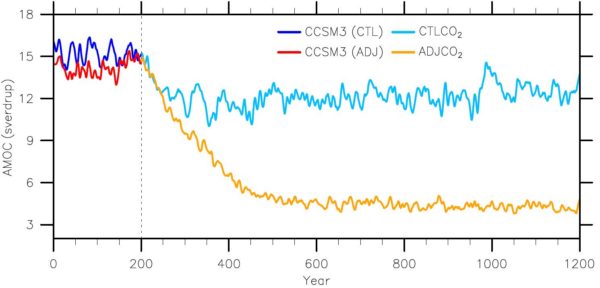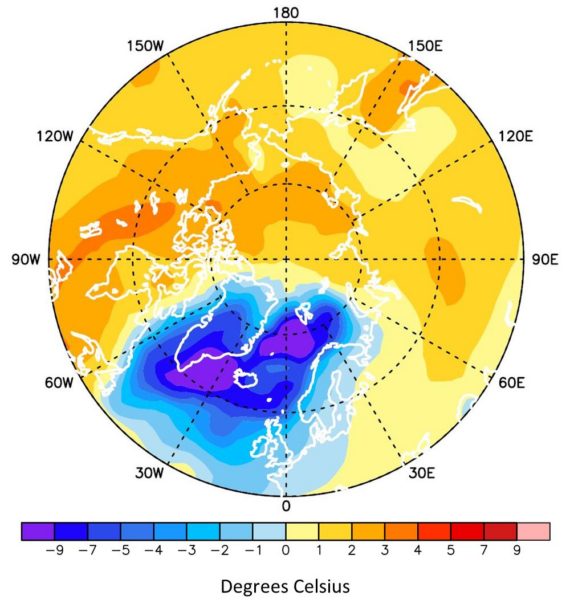Welcome to DU!
The truly grassroots left-of-center political community where regular people, not algorithms, drive the discussions and set the standards.
Join the community:
Create a free account
Support DU (and get rid of ads!):
Become a Star Member
Latest Breaking News
General Discussion
The DU Lounge
All Forums
Issue Forums
Culture Forums
Alliance Forums
Region Forums
Support Forums
Help & Search
Environment & Energy
Related: About this forumStudy finds potential instability in Atlantic Ocean water circulation system
http://news.yale.edu/2017/01/04/study-finds-potential-instability-atlantic-ocean-water-circulation-system[font face=Serif][font size=5]Study finds potential instability in Atlantic Ocean water circulation system[/font]
By Jim Shelton
January 4, 2017
[font size=3]One of the world’s largest ocean circulation systems may not be as stable as today’s weather models predict, according to a new study.
In fact, changes in the Atlantic Meridional Overturning Circulation (AMOC) — the same deep-water ocean current featured in the movie “The Day After Tomorrow” — could occur quite abruptly, in geologic terms, the study says. The research appears in the Jan. 4 online edition of the journal Science Advances.
“We show that the possibility of a collapsed AMOC under global warming is hugely underestimated,” said Wei Liu, a postdoctoral associate in the Department of Geology and Geophysics at Yale University and lead author of the study. Liu began the research when he was a graduate student at the University of Wisconsin-Madison, and continued it at the Scripps Institution of Oceanography, prior to coming to Yale.
AMOC is responsible for carrying oceanic heat northward in the Atlantic Ocean. It consists of a lower limb of denser, colder water that flows south, and an upper limb of warm, salty water that flows north. The system is a major factor for regional climate change, affecting the Atlantic rim countries, especially those in Europe.
…[/font][/font]
http://dx.doi.org/10.1126/sciadv.1601666 (Doesn’t work yet.)
By Jim Shelton
January 4, 2017
[font size=3]One of the world’s largest ocean circulation systems may not be as stable as today’s weather models predict, according to a new study.
In fact, changes in the Atlantic Meridional Overturning Circulation (AMOC) — the same deep-water ocean current featured in the movie “The Day After Tomorrow” — could occur quite abruptly, in geologic terms, the study says. The research appears in the Jan. 4 online edition of the journal Science Advances.
“We show that the possibility of a collapsed AMOC under global warming is hugely underestimated,” said Wei Liu, a postdoctoral associate in the Department of Geology and Geophysics at Yale University and lead author of the study. Liu began the research when he was a graduate student at the University of Wisconsin-Madison, and continued it at the Scripps Institution of Oceanography, prior to coming to Yale.
AMOC is responsible for carrying oceanic heat northward in the Atlantic Ocean. It consists of a lower limb of denser, colder water that flows south, and an upper limb of warm, salty water that flows north. The system is a major factor for regional climate change, affecting the Atlantic rim countries, especially those in Europe.
…[/font][/font]
http://advances.sciencemag.org/content/3/1/e1601666
InfoView thread info, including edit history
TrashPut this thread in your Trash Can (My DU » Trash Can)
BookmarkAdd this thread to your Bookmarks (My DU » Bookmarks)
1 replies, 2228 views
ShareGet links to this post and/or share on social media
AlertAlert this post for a rule violation
PowersThere are no powers you can use on this post
EditCannot edit other people's posts
ReplyReply to this post
EditCannot edit other people's posts
Rec (10)
ReplyReply to this post
1 replies
 = new reply since forum marked as read
Highlight:
NoneDon't highlight anything
5 newestHighlight 5 most recent replies
= new reply since forum marked as read
Highlight:
NoneDon't highlight anything
5 newestHighlight 5 most recent replies
Study finds potential instability in Atlantic Ocean water circulation system (Original Post)
OKIsItJustMe
Jan 2017
OP
muriel_volestrangler
(101,297 posts)1. Another "oh, no" moment. Some analysis of the paper:
The basic physical mechanism of this instability was already described by Henry Stommel in 1961. The freshwater balance (precipitation minus evaporation), which determines the salt content, is central to this. Freshwater continually flows into the northern Atlantic through precipitation, rivers and ice-melting. But supply of salty waters from the south, through the Gulf Stream System, balances this. If however the current slows, there is less salt supply, and the surface ocean gets less salty. This fresher water is lighter than saltier water and therefore cannot sink into the depths so easily. Since this sinking – the so-called deep water formation – drives the Gulf Stream System, the current continues to weaken. There is a critical point when this becomes an unstoppable vicious circle. This is one of the classic tipping points in the climate system.
However, it’s still unclear where exactly this tipping point is. Most models show a significant slowdown in the Gulf Stream System by 20% to 50% in typical global warming scenarios up to the year 2100, but do not exceed the tipping point that would lead to its collapse. However, there is a large spread between different models – which is not surprising since the stability of the Atlantic flow depends on a subtle balance in the salinity and thus also in the freshwater budget, which is only inaccurately known. In addition, there have long been serious indications that the models are not only inaccurate, but perhaps all systematically biased towards an exceedingly stable AMOC. We discussed these papers in a review article in PNAS in 2009.
...
With both model variants – with and without the subtle correction of the salinity distribution – an experiment was performed in which the amount of CO2 in the air was doubled. The reaction of the Atlantic circulation is shown in the following graph. Without correction, the AMOC once again proves to be very stable against the massive disturbance. With the correction, in contrast, the flow breaks down in the course of about 300 years. It has lost a third of its strength after 100 years.


http://www.realclimate.org/index.php/archives/2017/01/the-underestimated-danger-of-a-breakdown-of-the-gulf-stream-system/
However, it’s still unclear where exactly this tipping point is. Most models show a significant slowdown in the Gulf Stream System by 20% to 50% in typical global warming scenarios up to the year 2100, but do not exceed the tipping point that would lead to its collapse. However, there is a large spread between different models – which is not surprising since the stability of the Atlantic flow depends on a subtle balance in the salinity and thus also in the freshwater budget, which is only inaccurately known. In addition, there have long been serious indications that the models are not only inaccurate, but perhaps all systematically biased towards an exceedingly stable AMOC. We discussed these papers in a review article in PNAS in 2009.
...
With both model variants – with and without the subtle correction of the salinity distribution – an experiment was performed in which the amount of CO2 in the air was doubled. The reaction of the Atlantic circulation is shown in the following graph. Without correction, the AMOC once again proves to be very stable against the massive disturbance. With the correction, in contrast, the flow breaks down in the course of about 300 years. It has lost a third of its strength after 100 years.


http://www.realclimate.org/index.php/archives/2017/01/the-underestimated-danger-of-a-breakdown-of-the-gulf-stream-system/